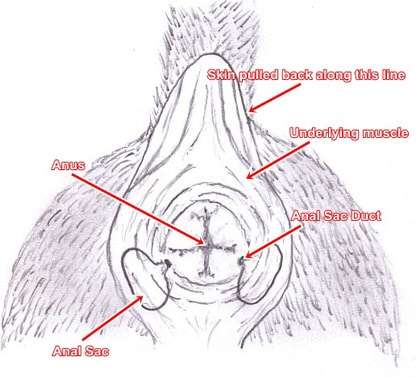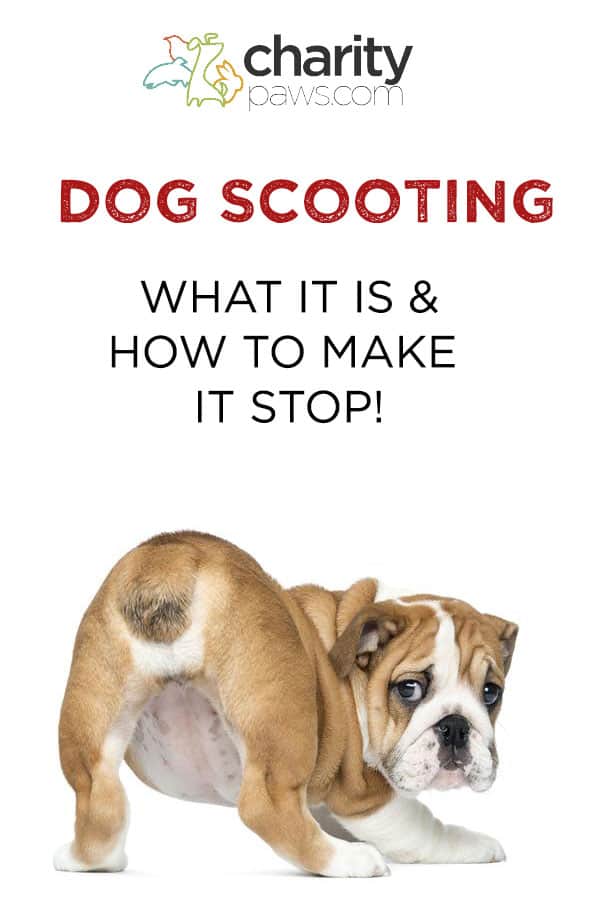Most dogs will drag their butt on the floor at some point in time! One minute they are sitting nicely and relaxing – the next they are doing circles on your carpet with their butt on the floor at which time you are probably starting to yell “no”!
My dog for whatever reason likes to do her dog scooting after a loose poop – we assume she just likes a clean butt.
Well, you will be glad to know that in most cases the dragging of their butts does not result in any gross markings on your carpet or mean they have any major medical issues but that does not make your dog dragging their butt any less gross.
But I am sure you are wondering why your dogs does this – and how you can make it stop, so let’s talk about this for a few minutes!
Why do dogs scoot their butts on the floor?

There could be a few reasons your dog is scooting their butts on your floor or on the ground outside.
It could be as simple as they have an itch that needs some scratching (we all have itchy butts once in a while!) – or something more complex like impacted anal glands or an infection of some sort.
Most typically it is an issue with a dog’s anal sacs.
Sometimes it can be their diet affecting their bowel movements.
Whichever it is – as a pet parent it is your job to help them get through it so they can be more comfortable.
What are anal glands or sacs?
These glands which are located on either side of a dog’s anus have small ducts that allow them to be emptied – but sometimes these small ducts can become blocked making life uncomfortable for your dog.
Typically a dog will lick or scoot to release any build up in these glands, but if they are blocked they may not be able to clean them properly.
These anal glands can rupture too – so be sure to keep an eye on your dogs behavior and check out their butts once in a while.
The fluid that builds up in these glands smells something horrible! If you ever notice a weird smell that grosses you out, especially after your dog is leaking near their butt – we can bet it is the smell of the fluid found in those anal sacs.
What is the purpose of these glands?
- They help an animal to release toxins
- The scent helps them to mark their territory
Common anal gland issues.
- Inflammation whether due to an infection or too much licking
- Abscesses which would require a vet visit
- Tumors which would also require a vet visit
- Blockage which you can either help express at home or take to the vet to have them do it
Below is a video that shows you how to express your dogs anal glands. While this is not for the week stomached – it is a fairly easy (but gross) thing you can do on your own. Make sure you have a llot of paper towels, use gloves and be ready for the smell!
Should you see a vet if your dog is scooting?
Most dogs will scoot their butt at some point, so typically it is not something you really need to worry about.
Yes, it may gross you out – but there usually is no physical issue that would require a vet visit unless you notice it is becoming more increased or if they are licking excessively in the anal area.
Signs or reasons a vet visit may be needed.
- If you dog begins to scoot their butts daily or multiple times a day this should warrant a visit as it could be a sign of infection or discomfort for your dog. If you notice it for 2 or 3 days in a row, make the call because you do not want it going on too long.
- Dog is having trouble pooping.
- You notice swelling or blood in the butt area.
- Excessive butt licking or chewing.
- Dog frequently emits a foul – fish like smell. Trust me you will know it when you smell it. YUCK!
If it seems like it is more about their bowel movements and not their anal glands, then we recommend tracking their movements and making a trip to the vet so your dog can be checked out.
Treatments for dog scooting issues.
Anal Glands
One of the most common treatments is for the veterinarian to squeeze the anal glands to release the fluid for your pooch when they were not able to do it.
This is the most common treatment that brings quick relief to your pet – it is quick, painless and most vets do this for a low cost. Some groomers offer this service as well so you can make it part of their grooming procedure to help keep them clean!
On rare occasions your pet may have an infection which would require an antibiotic to treat. Even rarer is impacted anal glands which may require the glands be removed permanently, but this is rare and only a final course of action.
Pooping Problems
If the scooting is due to pooping then diet would be the first change you would want to look at. You can visit with your vet with a stool sample to make sure something is not going on – but changing their diet may help them defecate easier bringing them more comfort. If you are feeding them a new food or treats like rawhide – you may want to review if something has changed in their diet that is making them uncomfortable.
Preventing dog scooting
Making sure you are getting your dog their checkups is one way to help prevent any issues with anal glands or pooping issues. Veterinarians will typically check their anal area during a checkup so this preventative measure can help!
Keeping your pet on a high fiber diet with plenty of exercise will help keep the bowels moving preventing any blockage.
Also, cats have anal glands as well – and while they have anal gland issues less often than dogs do – they can have them too so be sure to keep an eye on your feline friends for some of the same issues as above.


